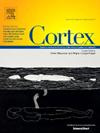Cross-language interaction during sequential anomia treatment in three languages: Evidence from a trilingual person with aphasia
IF 3.3
2区 心理学
Q1 BEHAVIORAL SCIENCES
引用次数: 0
Abstract
Language rehabilitation research has reported mixed evidence in bilinguals with aphasia suggesting that therapy can benefit the treated language alone or additionally result in cross-language generalization to the untreated language, while cross-language interference effects are less common. However, treatment effects in multilinguals with aphasia (MWA) have been less frequently investigated, and examining cross-language interactions during therapy may help to better understand their treatment response in each language. This study reports on P1, a trilingual person with severe aphasia with extensive damage to cortical language regions and the basal ganglia, who received sequential semantic-based treatment for anomia in her L3 French, L1 Spanish and L2 English. Overall, significant treatment gains in the treated language were restricted to her L3 French, the weakest language, while her treatment response was limited across languages likely due to severe language impairment and extensive damage to the language processing network. Cross-language generalization effects were absent and P1 showed cross-language interference in her L2 English during treatment in her L3 French. Cross-language intrusions were observed between languages, more frequently in her L2 English (the least available language in treatment) than in her L1 Spanish (the strongest language). The absence of cross-language generalization and presence of cross-language interference in P1 were likely due to damage in the basal ganglia and executive deficits reflecting damage to the language control network. Severe language processing and language control impairments can hinder the balance between activation and inhibition mechanisms necessary to support response to language treatment in MWA.
序贯三语治疗失语症期间的跨语言互动:来自三语失语症患者的证据
语言康复研究报告了双语失语症患者的混合证据,表明治疗可以使被治疗的语言单独受益,也可以导致未治疗语言的跨语言泛化,而跨语言干扰效应则不太常见。然而,对多语失语症(MWA)的治疗效果研究较少,在治疗过程中检查跨语言相互作用可能有助于更好地了解他们在每种语言中的治疗反应。本研究报道了一名患有严重失语症的三语患者P1,她的皮层语言区和基底神经节广泛受损,她的法语L3,西班牙语L1和英语L2接受了基于语义的顺序治疗。总的来说,治疗语言的显著改善仅限于她的L3法语,这是最弱的语言,而她的治疗反应在其他语言中有限,这可能是由于严重的语言障碍和语言处理网络的广泛损害。跨语言泛化效应不存在,P1在学习L3法语的过程中出现了L2英语的跨语言干扰。跨语言入侵在不同语言间被观察到,在她的第二语言英语(治疗中可用性最低的语言)中比在她的第一语言西班牙语(最强的语言)中更频繁。P1缺乏跨语言泛化和存在跨语言干扰可能是由于基底节区的损伤和反映语言控制网络损伤的执行缺陷。严重的语言处理和语言控制障碍会阻碍MWA中激活和抑制机制之间的平衡,而激活和抑制机制是支持语言治疗反应所必需的。
本文章由计算机程序翻译,如有差异,请以英文原文为准。
求助全文
约1分钟内获得全文
求助全文
来源期刊

Cortex
医学-行为科学
CiteScore
7.00
自引率
5.60%
发文量
250
审稿时长
74 days
期刊介绍:
CORTEX is an international journal devoted to the study of cognition and of the relationship between the nervous system and mental processes, particularly as these are reflected in the behaviour of patients with acquired brain lesions, normal volunteers, children with typical and atypical development, and in the activation of brain regions and systems as recorded by functional neuroimaging techniques. It was founded in 1964 by Ennio De Renzi.
 求助内容:
求助内容: 应助结果提醒方式:
应助结果提醒方式:


